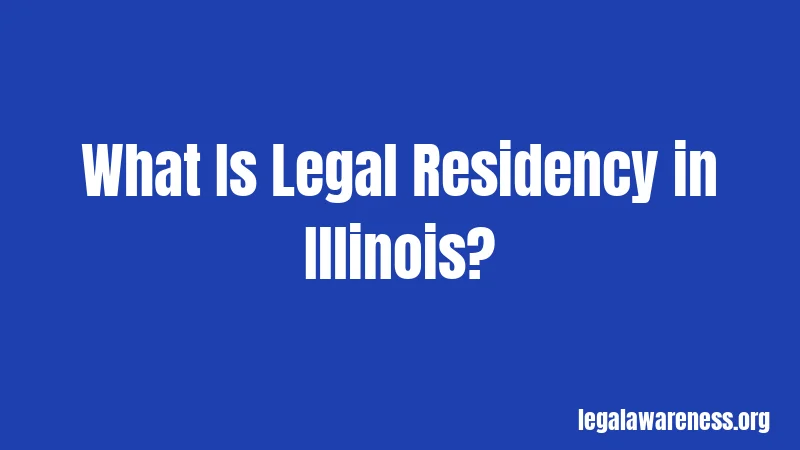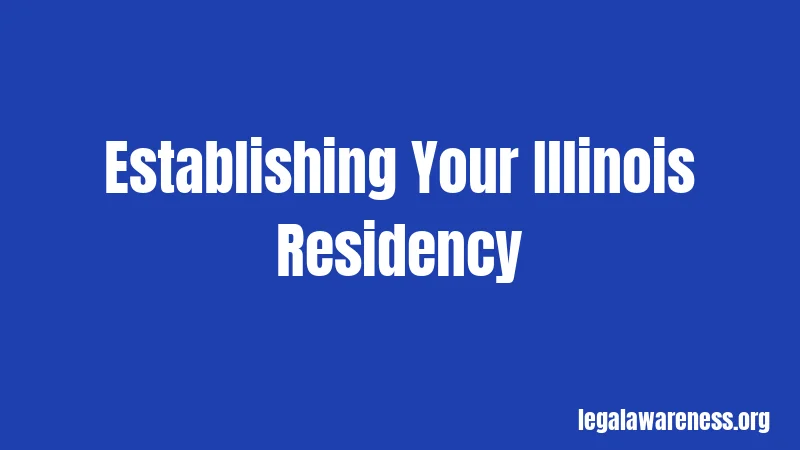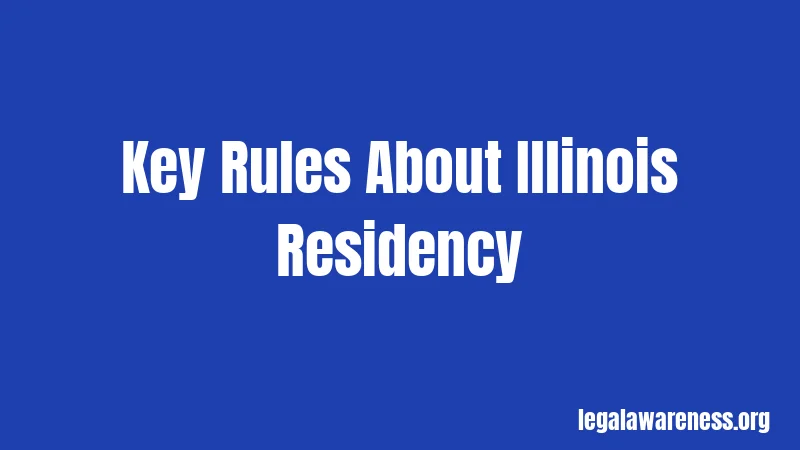Illinois Residency Laws (2026): What Actually Counts as Your Home
You probably think you know where you live. But legally? It’s way more complicated than just having a mailing address. In Illinois, residency matters for voting, taxes, driver’s licenses, and more. Get it wrong, and you could face serious consequences. Let’s break down what you actually need to know.
Illinois has some pretty strict rules about what makes you a resident. These laws affect everything from your voting rights to how much you pay in taxes. The good news? Once you understand the basics, it’s not that confusing.
What Is Legal Residency in Illinois?

Your legal residency is basically where the law says you actually live. It’s not just where you sleep or where you get mail. It’s the place you consider your permanent home. The state of Illinois uses this to figure out if you can vote there, file taxes there, or get an in-state tuition rate.
Here’s the thing: you can only have one legal residency at a time in Illinois. You might own property in multiple places. You might spend time in different states. But legally, you’ve got one main home in Illinois. That’s your residency.
How Illinois Determines Your Residency
Illinois looks at several factors to decide where you legally live. They’re not just checking one thing. They look at the whole picture.
Your primary dwelling is the biggest factor. If you own a house in Illinois, that usually counts as your residence. Same thing if you’re renting an apartment or living in a condo. The place where you spend most of your time? That’s what matters most.
But it gets more interesting from there. Illinois also considers where you’re registered to vote. If you voted in Illinois during the last election, that’s evidence you live here. It’s not the only thing they look at, but it counts.
Your driver’s license matters too. Illinois considers your address on your license as part of the picture. Where you registered your car, where you pay property taxes, where you work. All of these things add up to show where your true home is.
Not sure what counts as proof of residency? Your best options include a utility bill with your name on it, a lease agreement, property tax documentation, or a mortgage statement. Any of these basically shows where you’re actually living.
Establishing Your Illinois Residency

Okay, so you’ve moved to Illinois and you want to establish residency. What do you actually have to do?
First, you need a permanent address in Illinois. Get yourself somewhere to live. That’s the foundation. Rent an apartment, buy a house, or move into a dorm if you’re a student. You need an actual physical location in the state.
Next, register to vote in Illinois. This is important. Voter registration is one of the clearest ways to show residency. You can register online through the Illinois State Board of Elections or in person at your local polling place. Most people can register up to 15 days before an election, but check current deadlines.
Then, get an Illinois driver’s license or state ID card. Head to your local Secretary of State office. Bring your proof of residency with you. A utility bill or lease works great. Your driver’s license with your Illinois address is strong proof that you live here.
Update your car registration if you’re bringing a vehicle to Illinois. You’ll need to do this within a reasonable time after moving. Not doing this? You could face fines. In Illinois, you’re supposed to register your vehicle within 30 days of establishing residency.
Got this far? You’re pretty much there. The combination of a physical address, voter registration, driver’s license, and vehicle registration all point to one thing: you’re an Illinois resident.
Different Types of Residency Status
Here’s where it gets interesting. Not all residency is the same in Illinois.
Domicile residency is your primary, permanent home. This is what most people think of as residency. It’s where you intend to live permanently, or at least for an indefinite period. You can only have one domicile.
Statutory residency is what applies in specific situations. Students are a great example. A student might maintain domicile in their parents’ state while attending school in Illinois. But for school purposes, they might be considered a resident of the college’s location. It depends on the specific rules.
Tax residency is used by the Illinois Department of Revenue. You might be considered a tax resident even if you’re not a voting resident. This matters when you’re filing state taxes. If you earned money in Illinois, you probably owe state taxes, even if you don’t claim residency here.
Voter residency is specific to elections. In Illinois, you need to be a resident to vote. You also need to have lived in the state for at least 30 days before the election. So fresh arrivals can’t vote right away. You’ve got to wait a month.
Key Rules About Illinois Residency

Stay with me here, because this part matters a lot.
You cannot claim residency in multiple states at the same time. If you establish residency in Illinois, you’re basically giving up residency elsewhere. The law sees you as having one home. Period. You can’t be a resident of Illinois and Florida simultaneously, even if you spend time in both places.
Your residency doesn’t automatically end just because you leave Illinois. If you move away temporarily but keep your home here and intend to return, you might still be considered a resident. This is actually important for voting. Some people who’ve moved away can still vote in Illinois if they establish they intend to return.
College students need to pay special attention. If you’re attending school in Illinois, you might still be a resident of your parents’ state. This affects your tuition. But it also affects voting rights and other benefits. Don’t assume being a student here makes you a resident automatically.
What Happens If You Claim False Residency
Okay, this is where consequences come in.
Claiming false residency in Illinois is not a game. People do this for in-state tuition, voting illegally, or tax benefits. Don’t. It’s fraud, and Illinois takes it seriously.
If you lie about your residency to get in-state tuition rates, you could be charged with fraud. The penalty? Restitution. That means paying back the tuition difference. Institutions have been known to pursue students for tens of thousands of dollars. You could also lose your enrollment.
Voting illegally by claiming false residency? That’s even worse. You could face criminal charges. In Illinois, illegal voting is a felony in some cases. That’s jail time, not just fines. We’re talking potential prison sentences of up to five years.
Tax fraud based on false residency claims can bring serious penalties. The Department of Revenue doesn’t play around. You could face fines, back taxes plus interest, and penalties up to 50 percent of the underpaid tax. If it’s really bad, criminal charges are possible.
Here’s the thing: these institutions check. Universities verify residency with tax returns. Election officials cross-reference voter rolls. The IRS compares state tax returns to federal returns. Getting caught isn’t a matter of if. It’s a matter of when.
Special Situations and Exceptions
Not everything is straightforward, honestly.
Military personnel get special treatment in Illinois. If you’re stationed at an Illinois military base, you’re considered a resident for voting purposes regardless of where you originally came from. Your time on base counts toward the 30-day residency requirement. When you leave active duty, you can maintain Illinois residency if you intend to stay here.
Homeless individuals can establish residency in Illinois even without a permanent address. You can use a shelter address, a trusted friend’s address, or a community organization’s address as your residence. This is really important because it protects voting rights and access to services.
Incarcerated individuals don’t automatically lose residency. If you were imprisoned in Illinois, you might maintain residency here. This affects voting rights in some cases. It’s complicated, but the general rule is that imprisonment doesn’t automatically change your residency.
Business owners face unique situations. If you run a business in Illinois but live elsewhere, you’re probably not a resident just because your business is here. Your actual home location determines residency, not where you work.
People moving between homes sometimes live part-time in multiple states. Let’s say you spend winters in Florida and summers in Illinois. Where do you live legally? Illinois generally looks at where you spend the most time and where your primary home is. Documentation helps. Utility bills, lease agreements, tax returns. All of these show the whole picture.
Steps to Establish Illinois Residency
You’re moving to Illinois and want to do this right. Here’s your checklist.
First, secure a permanent address. Rent an apartment, buy a house, move in with family. Whatever works for you. But get an actual Illinois address.
Second, register to vote. Visit the Illinois State Board of Elections website or go to your local election office. You’ll need some identification and proof of residency. Registration usually takes minutes. Online registration is available and super convenient.
Third, get your Illinois driver’s license. Visit your local Secretary of State office with proof of residency. A utility bill works great. Processing usually takes about a week, sometimes less. Your new license is powerful proof of residency.
Fourth, register your vehicle. If you own a car, take it to your local Secretary of State office. You’ll need your title and proof of Illinois residency. Vehicle registration establishes you as a state resident pretty clearly.
Fifth, update your address with important institutions. Tell your bank, your employer, your insurance company. Get mail from the state addressed to your Illinois home. All of this builds up your residency claim.
Finally, keep documentation. Save utility bills, lease agreements, tax returns filed from your Illinois address. If your residency is ever questioned, this paper trail proves everything.
Recent Changes to Illinois Residency Law
Illinois updated some residency rules in 2024. They made it easier for people to establish residency, particularly for voting.
The state reduced the residency requirement for voting from 30 days to 15 days before an election. This was meant to help new residents participate faster. But the 30-day residency requirement for general residency status remains the same.
They also simplified the process for homeless individuals to register to vote. Community organizations can now officially certify addresses for people without permanent housing. This protects voting rights for vulnerable populations.
Illinois also clarified rules for students. If a student establishes a permanent residence in Illinois separate from their school, they’re considered a resident. But if they’re just living in a dorm temporarily, they might not be. It depends on the documentation they provide.
Frequently Asked Questions
Can I have residency in two states at the same time? No. Illinois law says you can have only one legal residency. If you establish residency in Illinois, you’re giving up residency elsewhere. You might live in multiple places, but you’ve only got one legal home.
What if I just moved to Illinois last week? Can I vote? Not yet. You need to have been a resident for at least 30 days before an election to vote. So if you moved last week, you’ll be able to vote in the next election cycle, but not the upcoming one. Check specific election dates to be sure.
Does owning property in Illinois make me a resident? Not automatically. You could own a vacation home in Illinois but live somewhere else legally. Your primary dwelling and where you spend most of your time matter more than ownership. That said, owning property definitely helps establish residency if you actually live there.
I’m a student living in an Illinois college dorm. Am I a resident? Probably not, unless you also have another permanent home in Illinois. Most students maintain residency in their parents’ state while in school. Talk to your school’s registrar to understand tuition rates and how residency affects you.
What document proves I’m an Illinois resident? No single document proves it. It’s the whole picture. Utility bills, lease agreements, driver’s licenses, voter registration, tax returns, and vehicle registration all add up to show residency. Having several of these is powerful proof.
How long does it take to establish residency in Illinois? Generally, 30 days. Once you’ve lived in Illinois for 30 days with a permanent address, you’re considered a resident. That’s when voting rights kick in too. But establishing proof through driver’s licenses and registration might take longer. Those processes can be a few weeks.
Do I lose residency if I move out of Illinois temporarily? Not necessarily. If you keep a home here and intend to return, you might maintain residency. But if you move permanently to another state and establish residency there, you lose Illinois residency. It comes down to intent and actual living situation.
What happens if my address changes within Illinois? Update your driver’s license and vehicle registration. Tell the Illinois State Board of Elections about your voting address change. Let your bank and other institutions know. It’s not complicated, just make sure everything reflects your current address.
Final Thoughts
Illinois residency might seem complicated, but it really comes down to basics. Where do you actually live? Where do you intend to stay? What documentation proves you’re here? Answer those questions honestly, and you’re golden.
The key is being straightforward about it. Don’t claim residency you don’t have. Don’t lie about your address for benefits. The consequences aren’t worth it. Instead, follow the simple steps to establish real residency. Get your address registered, get your driver’s license, register to vote.
Once you’ve got your residency sorted, everything else flows from there. Your voting rights are protected. Your taxes are straightforward. You get in-state benefits you’re entitled to. It all works because you did it the right way.
If you’re still uncertain about your specific situation, reach out to the Illinois Secretary of State office or the Illinois State Board of Elections. They can answer detailed questions about your individual circumstances. When in doubt, ask. Better to be sure now than to face problems later.
Now you know the basics. Stay informed, keep your documentation organized, and you’re all set.
References
Illinois Secretary of State – Voter Registration
Illinois State Board of Elections – Residency Requirements
Illinois General Assembly – Compiled Statutes on Residency
